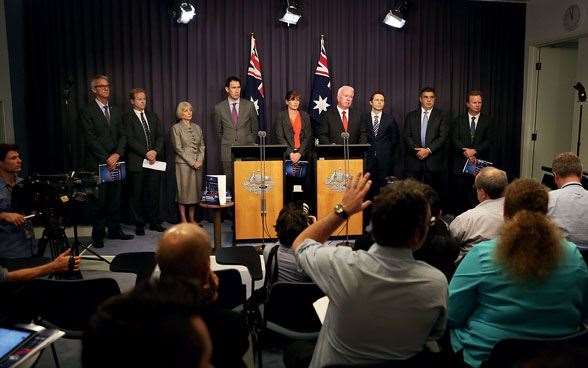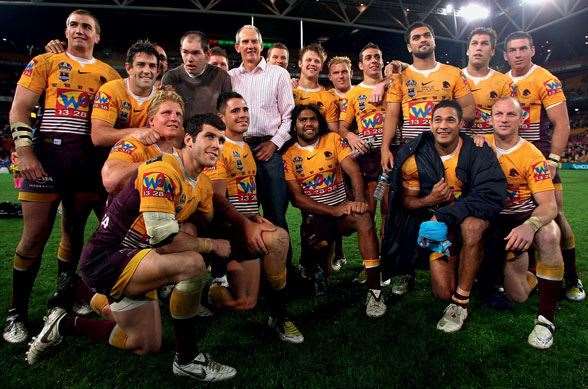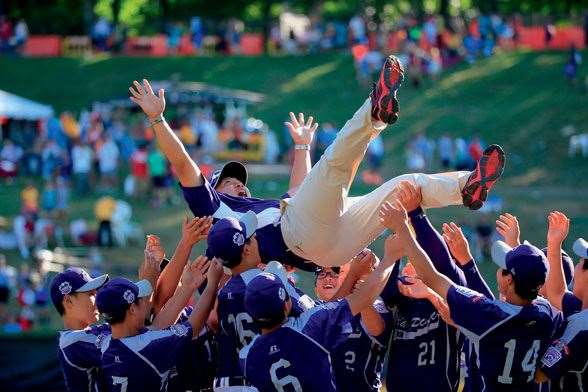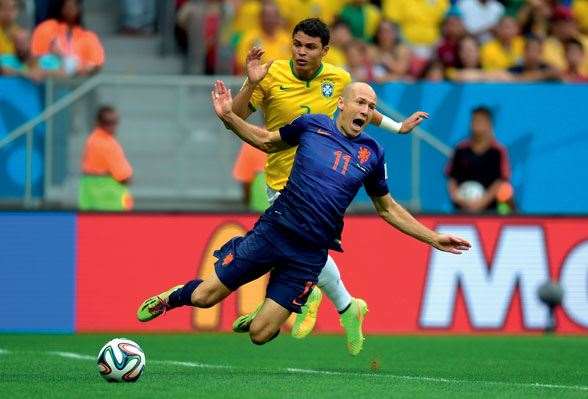"Winners" hard to find in a sporting month of high drama.
LOSER - ASADA
It is a testament to the size and scale of the shambles that has been ASADA’s now-infamous “peptide” investigation that the football world is still split. Did the Essendon Bombers and Cronulla Sharks take banned substances, or not? Position A: they did, and they knew it at the time, and so they deserve everything that has come at them. Position B: no, they didn’t take anything illegal, and they have been hung out to dry.
The answer? Apparently ASADA has enough evidence of doping violations to spook the Sharks players into accepting their “guilt” and backdated bans rather than contesting the charges; it was reported that players were shown several pages of documents. But at the time of writing the rest of us still don’t know what that evidence is – and there is the strong suggestion that the players were so sick of the whole thing that they took the rap just so they could put it behind them, keep playing for the next two years, and make a living. Essendon players, it seems, remain convinced of their innocence – that the club played their whole supplements regime within the rules. We DO know that the AFL sent suspicious samples of Essendon blood to Europe to be tested for peptides in 2012 – and there were no positives.
Here’s what we can say. This has been a terrible episode for the anti-doping cause. On all available evidence (that which has not been cloaked behind Criminal Justice Commission secrecy provisions), this investigation was hijacked by political forces. We strongly suspect that the Labor government of the day fast-tracked this investigation right on to the front pages of every newspaper in the land – at the expense of Australian sport’s international reputation. All for a few weeks’ respite from headlines unhelpful to their re-election prospects? What else are we to think?
The “we will find you!” threats of the time have turned out to be empty. The links between doping and match-fixing have never been brought up since that first press conference.
If we give the then Sports Minister Kate Lundy the benefit of any doubt, it might be that the anti-doping cause had been emboldened the world over by the prized scalp of Lance Armstrong – and the fact that certain witnesses were able to get drastically reduced sentences in that case for testimony that brought down a bigger fish. Perhaps Lundy and her colleagues thought they could flush out offenders in the football world and claim a scalp to compare ...If that’s the case, they sure got that wrong.
 Was the government of the day just setting out to land a big Armstrong-sized fish of its own? (Photo by Getty Images)
Was the government of the day just setting out to land a big Armstrong-sized fish of its own? (Photo by Getty Images)LOSER - COACHING CAROUSEL
In probably the surest sign that our main footy codes have become honest-to-goodness professional leagues, the coaching carousel in the NRL and AFL is spinning at ever-dizzier speeds. The men on the sideline are well-compensated for their gig, and they are aware what they’re getting themselves into, so it’s hard to feel too sorry for them. But the profession, as a number of ex-coaches in the media have noted, has taken a turn to the vicious. Roy Masters, in his Fairfax newspaper column, compared the job to that of a well-paid relief teacher. Expectations have become unreasonable, and it seems the primary function of the coach these days is to be the focal point for accepting blame, while credit is more widely distributed.
In many respects, this is the natural endpoint of modern footy. Capped, corporatised and awash in scrutiny, our leagues are structured in a way to maximise the pressure on coaches. The paranoia long associated with the worst of the coaching ranks has almost become the norm. Post-game bleating about referees is less an honest critique and more the stressed-out venting of otherwise smart football men whose fates are jangling beyond their control. On top of it all, many clubs regard themselves as only one good hire away from an instant reversal of fortunes, so much so, they’ll be willing to pay a Wayne Bennett the kind of superstar money that you could once only get from being on the field.
The irony of Bennett’s second go-round at Brisbane next season is that the kind of tenure he achieved in his first no longer exists. The notion that there will be another 20-year coach anywhere borders on fanciful.
LOSER - SALARY CAP
We’re about due, if previous intervals are any indication, for a major salary cap breach. And what do you know, there are three investigations going on in the NRL presently, as Brisbane, Parramatta and Gold Coast are all being run under the auditor’s eye.
Unfortunately, the way the cap system is set up, we’ll have these “scandals” periodically. But part of the issue is to cast salary cap breaches in moral terms – we go straight to the notion that overspending the cap constitutes a grievous betrayal of the game’s trust, rather than asking whether a club that makes money should actually be entitled to spend it, or if teams in varying markets with different commercial pressures can be covered under the one financial ceiling.
It is an incredibly blunt view – that payroll is destiny. If the success of the Melbourne Storm framed the current attitude toward the cap, the recent fortunes of the Broncos, Eels and Titans are one hell of a rebuke. The adverse effects of the NRL’s “hard” cap have become evident: the inability to retain marquee players, the squeeze on veterans and promising youngsters in the second tier, the disadvantages for teams such as Canberra in pursuing off-contract players.
The NRL conducted a review to allay these concerns, but its commitment to the cap system was unquestioned. It remains a cornerstone of a league that believes in equalisation, to the extent that the prospect of a player draft is being raised again. Rather than think in terms of a softer, more loopholed cap, or even a radical rethink along the lines of the luxury tax system in several US sports, the footy codes here are dedicated to their principles of equalisation. Equalisation is a philosophical choice, and once chosen in a big way, there’s no telling how far down the rabbit hole you have to go with it – not content with capping players in the AFL, which is equally fervent in its equalising, we now have capping of football department spending. Before long, teams should properly start asking for equal treatment on the television schedule, like political candidates.
 There won’t be another 20 years of domination from a Wayne Bennett-coached Brisbane second time around. (Photo by Getty Images)
There won’t be another 20 years of domination from a Wayne Bennett-coached Brisbane second time around. (Photo by Getty Images)WINNER - LITTLE LEAGUE WORLD SERIES
Even after 75 years, the Little League World Series is a refreshing tonic for the worst cases of sports cynicism. The most recent playing of the youth baseball classic last August produced some of the event’s most memorable moments yet (and shout-out to Australia’s representatives, Perth Metro North). Mo’Ne Davis, the uncommonly poised pitcher from Philadelphia, had spectators riveted as she forever laid waste to the insult “you throw like a girl”. And if you’re in need of inspirational uplift, punch the name “Dave Belisle” into YouTube. The Rhode Island coach’s post-game talk to his teary-eyed players, which became a social media sensation, is a reminder of just how wonderful youth sports can be, win or lose.
 Team Asia-Pacific weren’t the only winners at the Little League World Series ... (Photo by Getty Images)
Team Asia-Pacific weren’t the only winners at the Little League World Series ... (Photo by Getty Images)LOSER - "STAGERS"
Have our elite footballers learned anything by watching the FIFA World Cup? Definitely maybe ... Especially at the pointy end of the season, where a free kick can mean the difference between advancing or imminent Mad Monday. In the AFL, the debate over “stagers” was recently reignited, especially if you followed Shane Warne’s tweets about Adam Goodes.
And it’s also going on in the NRL: witness the dramatic writhing and face-holding of Canterbury hooker Michael Ennis in response to the extended foot of Rabbitoh Issac Luke in Round 25, whose boot may or may not have grazed his forehead ... There were at least two teams who would have thanked Ennis if Luke had been rubbed out for the following two weeks ... But spectators?
Warne was no doubt too quick on the draw in his allegations against Goodes. And Luke’s acquittal of kicking charges makes Ennis look silly. But it’s an important line in the sand being held here by Australian football leagues and fans of all persuasions. We do NOT want our oval-ball games to mimic this aspect of soccer.
As we wrote last month of the FIFA World Cup, diving and faking was still a curse, and the routine exaggeration by players fouled is a continuing blight on the game ... “To Australian sports fans’ eyes, who have grown up watching codes where the display of pain is considered a sign of weakness, it’s a serious impediment to their enjoyment of the world game, which will take time to overcome.” The AFL has already jumped on it with a directive to the match review panel back in 2012 “to be more stringent on staging, with excessive exaggeration of contact in an unsportsmanlike manner to be a reportable offence in addition to feigning contact.”
While Warney was out of line in his shot at Goodes, he sent an important message to all Australian players: if you bung it on, you will wear the opprobrium of fans – even those on your own side. This is a punishment greater than being rubbed out for a few weeks. It mightn’t be particularly fair, but they have been warned: once a stager, always a stager ...
 “Staging” players win penalties, but lose the respect of Aussie football fans of all codes. (Photo by Getty Images)
“Staging” players win penalties, but lose the respect of Aussie football fans of all codes. (Photo by Getty Images)
Related Articles

Jack test positive to prohibited substance

There are differing standards for athletes in sport













